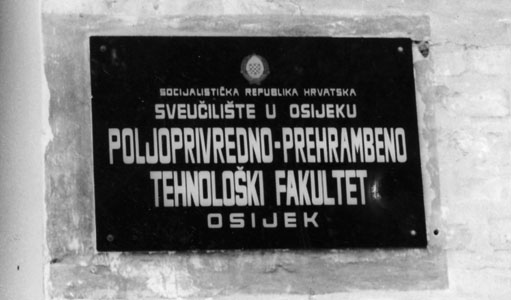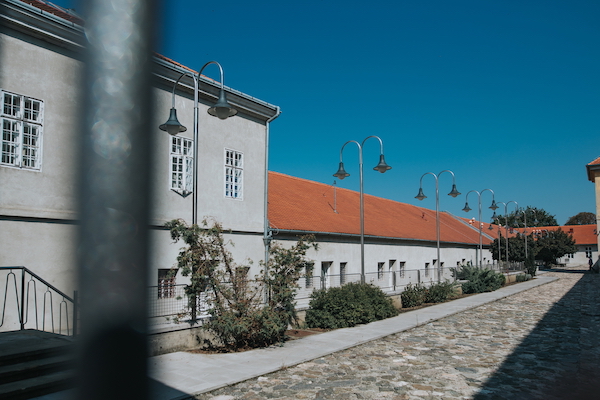HISTORY OF HIGHER EDUCATION IN OSIJEK
The history of higher education in this area began almost three centuries ago, i.e. in 1707, when the first institution of higher education was founded in Osijek. It was the Higher Theological School, which was opened in the 1707/1708 academic year as Studium Philosophicum Essekini, and included a three-year course of studies in philosophy.
The significance of the first colleges in Osijek lies in their huge contribution to Croatian language and literature, the spreading of liberal-arts education, and the study of languages and classical literature.
The recent history of higher education in the area began in 1959 when the Zagreb Faculty of Economics, in accordance with the University of Zagreb, founded the Centre for part-time studies in Osijek as a branch of the Zagreb Faculty of Economics. The initiative for the founding of the University of Osijek dates back to 1975. On 26 March 1975, the Croatian Parliament (Sabor) passed the Decision granting consent for the establishing the University of Osijek. Two months later, on 31 May 1975, the Agreement concerning the founding of the University of Osijek was signed by the Faculty of Economics, the Faculty of Agriculture and Food Processing, the Institute of Agriculture, the Zagreb School of Engineering and Naval Architecture for Engineering Studies in Slavonski Brod, the Teacher Training College in Osijek, the Zagreb Music Academy for the Music Department in Osijek, the City Library and the Historical Archives in Osijek. Therefore, we celebrate 31 May as the day when the University of Osijek was founded.
In this brief outline we need to point out several important years in the history of the founding of the various faculties of the University of Osijek: in 1975 the Faculty of Law, in 1976 the Faculty of Food Technology, in 1977 the Faculty of Education, in 1979 the School of Engineering in Slavonski Brod and Medical Studies in Osijek, which developed into the Faculty of Medicine in 1998, in 1982 the Faculty of Civil Engineering, in 1990 the Electrical Engineering Studies developed into the Faculty of Electrical Engineering, and in the same year, the University Senate passed the Decision to include the name of Josip Juraj Strossmayer in the name of the university. Joseph George Strossmayer, (Croatian: Josip Juraj) was bishop and theologian, politician and statesman. He was one of the most famous Croats in the world, known as a promoter of Croatian culture and the people's tribune, whose entire life was devoted to advancing the welfare and progress of Croatian people. He was born on February 4, 1815 in Osijek, died April 8, 1905 in Đakovo.
Strossmayer was a true predecessor of modern ecumenical quests for unification and open dialogue, and he strove for unity and cooperation despite differences, casting away centuries of misunderstanding and conflict. His personality, ideas, broad viewpoints, global reasoning and his overall legacy have been recognized and followed even today in the mission of the University of Osijek.
We need to point out that the academic year 1991/1992 began in wartime Croatia. We must emphasize that the University of Osijek was the only university in Croatia that suffered severe damage in the war for independence.
FACULTY OF AGRICULTURE AND FOOD TECHNOLOGY
Due to needs of food industry of Slavonia and Baranja, the Economic Chamber Osijek in 1970 accepted the initiative of several professors from Zagreb, Faculty of Technology - Biotechnology Department for founding the Food Technology Department at the Higher Agricultural School in Osijek.. In 1971 the Higher Agricultural School evolved into the Faculty of Agriculture and Food Technology (FAFT) by the decision of the Parliament of Federal Republic of Croatia. Within the FAFT , Department of Food Technology has worked through the Committee for study, whose president at the same time also was the Assistant Dean. Study of Food Technology was held, according to the special curriculum, within the FAFT, the Pedagogical Faculty, Electrometal School Centre and Technical School "Ruđer Bošković".

Ploča na ulazu Poljoprivredno-prehrambeno tehnološkog fakulteta
FACULTY OF FOOD TECHNOLOGY OSIJEK
The University of Josip Juraj Strossmayer was founded in 1975. It was established by decission of Croatian Parliament in March 1975, and the Agreement concering the founding of the Univerity of Osijek was signed by eight institutions on May 31st 1975. Development of the Food Technology Department and establishment of the University in Osijek resulted in the creation of real conditions for establishing the Faculty of Food Technology as an independent unit. Faculty of Food Technology was acted independently since 1976. At that time, at the Faculty of Food Technology engineers of Food Technology, Department of Food Engineering, have been educated with two orientations, food canning and food extractive orientation. Parallel to the independence a new, building of modern scientific-research complex was started on the Tenje road. After new building first construction phase completion, , Faculty started its relocation to Tenje road bb and entered into a building where they placed classrooms, offices and spaces for the dean's office in 1980. After six years, the Faculty was placed in second new building with modern student and research laboratories. The contemporary restaurant "Gaudeamus" and a modern library were opened at the Faculty for students' and employees' needs. The infrastructure was completed at the modern university center in 1989.
Faculty had sufficient number of scientists who have participated in numerous national and international conferences. In this way, they created all the conditions for intensive teaching and scientific research, as well as collaboration with industry where many engineers of Faculty of Food Technology Osijek already worked.
FACULTY IN EXILE
Since the Faculty was situated on Tenjska road, during the war in 1991 and 1992, it suffered huge devastation. However, in spite of that and the fact that the significant part of the employees had left the Faculty, activities continued even in those difficult days. Thanks to the help of Faculty of Food Technology and Biotechnology Zagreb, some activities were transferred to Zagreb where students continued tending classes as guest students. Furthermore, some students and employees of the Faculty were actively involved in defending Croatia from the aggression.

Posljedice ratnih razaranja Fakulteta na Tenjskoj cesti 1992.

Posljedice ratnih razaranja Fakulteta na Tenjskoj cesti 1992.
Despite all war dangers, employees who remained on the Faculty managed to save most of the equipment from Tenjska road although they were literally threatened by the grenades. The capital equipment was stored in the basement of Privredna Banka in Osijek and in December 1991 it was transferred to Zagreb. Thanks to that and due to rescuing the furniture from the same location afterwards, Faculty of Food Technology Osijek has equipped laboratories and cabinets today.
During the Croatian War of Independence and post-war years (till the final Faculty location in Tvrđa) teaching and other Faculty activities were performed at several locations in Osijek:
- Public University (students’ office and classrooms for 2nd, 3rd and 4th year),
- Student centre (1st year classroom),
- Technological and Medical School (research and students’ laboratories),
- Preschool Centre (legal services, accounting office and library),
- Pedagogical Faculty (laboratories) and
- Faculty of Electrical Engineering.
Thanks to help of listed institutions, the Faculty was able to work in exile as well. On the occasion of the 30th Anniversary of the Faculty, and due to the Faculty Council decision, acknowledgements were given to the Faculty employees, institutions and individuals, who had been helping the Faculty from its beginning and especially during the Croatian War of Independence, which enabled continuous action even during the time of aggression on Croatia.
Today
Today, the Faculty of Food Technology Osijek is a modern institution of higher education that conducts various scientific and professional activities, and provides eight different university courses. The course programmes are compatible with similar course programmes in Europe. The concept of lifelong learning is implemented through various programmes, which, along with the formal education programmes, constitute education implemented in accordance with the Bologna process. Some of the employees at the Faculty are members of the highest government bodies, as well as scientific and professional organisations and institutions. The employees of the Faculty of Food Technology have won many domestic and international awards. All the achievements and successes of the students and employees at the Faculty are the result of continuous work on improving the conditions at the study programmes and advancing the quality of teaching, scientific work, and professional work at the Faculty.
All the activities of the Faculty are conducted at three locations in the Osijek Tvrđa, the old city centre of Osijek, which is a protected cultural site and is subject to special regulations concerning the preservation and protection of cultural assets (Franje Kuhača 18 and 20, and Trg Svetog Trojstva 3).
The Faculty consists of:
- Department of Applied Chemistry and Ecology
- Department of Food Technologies
- Department of Food Research and Nutrition
- Department of Process Engineering
- Independent subdepartment
CERT-ING is an independent organisational unit of the Faculty which connects and develops the scientific-research and professional work; additionally, it is in charge of publishing, counselling, and some other activities which promote the registered Faculty activities.
Starting with the academic year 2005/2006, the Faculty adapted the structure of formal higher education which was implemented according to the principles of the Bologna process. The study programmes have been organised according to the “3 + 2” concept, i.e. three years of undergraduate study (Food Technology), followed by two years of graduate studies (Food Engineering; Process Engineering; Food Science and Nutrition). After a student acquires their diploma, the Faculty offers them the option to continue their education as part of a university postgraduate study programme (Food Technology and Nutrition) and three postgraduate specialist study programmes (Food Safety and Quality; Technology of Traditional Meat Products; Nutrition).
Over 2000 students completed one of the study programmes at the Faculty, which demonstrates a long-standing tradition in educating high quality personnel and a great contribution to science and the profession, and, along with the employees employed at the moment and students at the Faculty, comprises one big happy family of the Osijek school of food technology, which contributed to the fact that our food industry is keeping up with the European food industry through their professional engagement.
Aside from formal education, since 2011, Faculty has started and is still implementing various education programmes as part of the lifelong learning concept (13 programmes), which fully meet the requirements from all the components of the Bologna process. With the successful realisation of those education programmes, Faculty further strengthened its function as a public educational and scientific institution and enhanced its relationship with the business sector.
Since 2009, the Faculty has been publishing the international scientific and professional journal Croatian Journal of Food Science and Technology. The journal is aimed at scientists, professionals, students, and the wider social community. Also, the Faculty co-publishes, along with the Faculty of Pharmacy and Technology of the University of Tuzla, the international scientific and professional journal for nutrition and dietetics Food in health and disease, which is being published since 2012. The journal is focused on the area of nutrition and dietetics, or the effect of food ingredients and diet on the human organism.
The organisation of scientific conferences is a very important segment of promotion for science and the profession, as well as for the institution. The Faculty organises several international and domestic scientific and professional conferences:
- Ružička Days,
- Water for All,
- With Food to Health,
- ISC Green,
-
Young researchers’ day.
-
Food Industry By-Products
Every year, the Faculty participates in the organisation of various events (lectures, forums, and workshops) as part of the event titled Science Festival, and it also organises the events titled Science Night and School of Chemistry. The number of 1000 visitors of all ages that come to the Faculty during those events is proof that the Faculty is attractive and that it offers interestingly designed workshops and lectures. The goal of the mentioned activities as to bring science closer to the public, i.e. inform the public about the activities and results in the area of science, improve the public perception of scientists, and motivate young people to engage in research and acquire new knowledge. The students, assistants, and teachers at the Faculty are exceptionally active in their role of promoting science. Since 2017, the students from the Faculty have also been participating in Science Night, an event organised by our Faculty, where they also participate in various workshops and other activities.
The activities at the Faculty in the near future will be focused at solidifying its position as one of the leading teaching and scientific institutions in this part of Croatia and the wider region, aimed at implementing internationally recognised scientific, developmental, and professional research from the area of biotechnical, technical, and natural sciences. The Faculty will continue to educate internationally recognised experts and be a reliable partner for the economy, domestic and international educational institutions, and for students. Special attention in the near future will be dedicated to monitoring the needs of the labour market and, accordingly, introducing new study programmes, primarily interdisciplinary programmes, in cooperation with the other constituents of the University, as well as shorter education programmes as part of the concept of lifelong learning.



